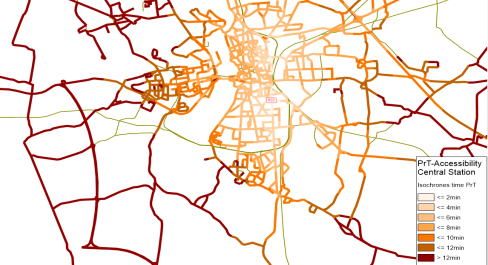Selected network objects can either be the origin or destination for isochronoe calculation. If the reference object is the origin, the isochrone specifies the locations that can be reached from the selected object after a same time period. If the reference object is the destination, the isochrone specifies locations from which the network object can be reached after a same time period.
The accessibility of network objects is determined via a shortest path search. Thereby the following attributes are used as search criteria:
- tCur (travel time in loaded network)
- t0 (travel time in unloaded network)
- Distance
- Impedance
- AddValues 1 to 3
|
Note: When selecting the route choice criterion, note that t0, tCur and Impedance correspond to each other as long as no assignment has been calculated. |
You can use nodes, main nodes and zones (or a combination of them) as reference points of PrT isochrones. To reduce computation time for isochrone calculation when using larger networks, you can specify a maximum value. The calculation process is then canceled once the maximum value for a link in the respective search direction is reached. The network areas lying outside this specified area are not taken into account.
The results of PrT isochrone calculation are listed under the attribute Isochrones time PrT of nodes, main nodes and zones. The minimum run time is listed for each network object.
The following options are available for displaying PrT isochrones graphically in the Network editor:
- Display of the accessibility of link sections
- 2D drawing
- Classified display of nodes, main nodes and zones by Isochrones Time PrT

Illustration 240: PrT journey time to destination: display on link sections

